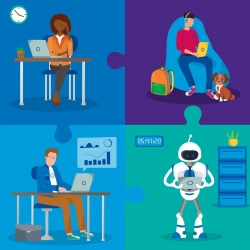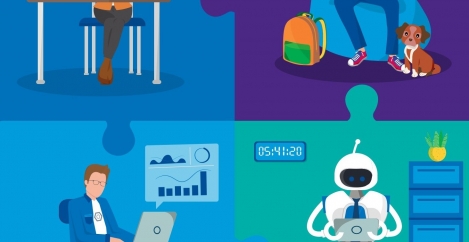July 18, 2023
CIPD says HR professionals should ‘lean in’ to artificial intelligence
 The swift rise of generative artificial intelligence and its potential impact in the workplace puts people professionals at the heart of understanding how this fast-evolving technology can be responsibly used, and the business impact it may have, according to the CIPD. To support this change, the trade body has launched a new guide, Preparing your Organisation for AI Use, which stresses the importance of people professionals creating clear policies on the use of easily accessible, web-based generative AI tools such as ChatGPT and Google Bard.
The swift rise of generative artificial intelligence and its potential impact in the workplace puts people professionals at the heart of understanding how this fast-evolving technology can be responsibly used, and the business impact it may have, according to the CIPD. To support this change, the trade body has launched a new guide, Preparing your Organisation for AI Use, which stresses the importance of people professionals creating clear policies on the use of easily accessible, web-based generative AI tools such as ChatGPT and Google Bard.
The CIPD is calling on HR teams to be curious, to innovate and engage with AI, but to also have a considered and measured approach to how it is used by people teams and across organisations, based on principles about ethical and responsible use.
The report claims there are significant potential opportunities to be realised in evolving jobs and roles across organisations, by enabling people to work smarter and add greater value using artificial intelligence. But there are also real risks that people may get left behind, become disempowered or lose out in other ways if AI is not used responsibly.
When developing policies for AI and its use, the CIPD says people professionals must be aware of data security and GDPR issues, and whether there is local legislation or requirements to comply with industry regulators. HR teams in particular must lead from principles of fairness, transparency and accountability, and for example to be aware of risks of bias, as well as of the longer-term issues of skills and changes to jobs and roles.
However, the CIPD’s latest guidance also demonstrates how experimenting with AI and adopting it where appropriate could help HR professionals with their work, freeing time from more administrative work to add greater value. For example, AI tools can help people teams efficiently complete tasks like creating personalised onboarding packages for new starters, and in drafting policies or job descriptions.
Ultimately, AI has the potential to help across a huge range of jobs and roles to access information quickly, accelerate learning, build strategy and fundamentally change the world of work, but this must be done within appropriate frameworks and clear guiding principles.
The CIPD is recommending that people professionals:
- Set guidance based on principles – Establish guidelines for how you understand and approach AI within your organisation and communicate these clearly to all staff. Guidelines should be based on ethical and responsible principles to ensure human-centred, transparent and accountable use of AI, but also to manage possible risks around data privacy and security.
- Engage and develop your people – Commit to engaging your people and helping them develop opportunities for improving their roles and value by encouraging experimentation and trials with AI and fostering a culture of shared learning across teams. This will help increase awareness, collaboratively drive benefits, and address concerns that arise.
- Think strategically – Understand how AI may impact your business, your operating model, and your competitive positioning. Be curious, learn from others, and aim to keep abreast of AI developments, recognising risks of disruption and new competitive threats, as well as looking for potential positive outcomes for your business today and in the long term.



















